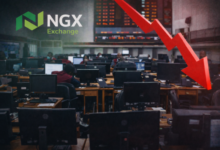SEC in full control of regulation of crypto, digital assets, says Agama
 The Securities and Exchange Commission (SEC) says the regulation of crypto-currencies and other digital assets are under its full control and regulation.
The Securities and Exchange Commission (SEC) says the regulation of crypto-currencies and other digital assets are under its full control and regulation.
The Director-General of SEC, Dr Emomotimi Agama, said this at the first Annual Conference of the Association of Capital Market Academics of Nigeria (ACMAN) on Thursday in Abuja.
Agama described crypto assets as digital or virtual assets utilised by cryptography for security.
He said there were over 15,000 crypto currencies created which had Bitcoin as the most popular.
$Davido Meme Coins just for fun, don’t invest, SEC warns Nigerians
The director-general said that the regulatory landscape for cryptocurrency was not yet firm even in the United States.
According to him, Nigeria’s crypto transaction volume had reached $56.7 billion between July 2022 and June 2023, hence the efforts by SEC.
Agama quoted a survey which said that 33.4 per cent of Nigerians were using or owned crypto currencies.
”Secrecy of crypto usage is what is driving its adoption by the youth.
”Some people don’t have bank accounts but they have crypto wallet.
”Crypto is like an air, can you cage it, No. What you can do is to build a risk management around it, ”he said.
Agama said the commission would continue to educate investors on the risks associated with digital assets to be able to make wise investment decisions.
Chief Osita Izunaso, the Chairman, Senate Committee on Capital Market, said the country required effective crypto regulation to benefit from the gains of the market.
Izunaso said the absence of effective regulation on crypto currencies had exposed so many investors to fraud.
He called for synergy from all stakeholders to harness opportunities in the crypto space.
The Director-General of the Debt Management Office, Ms Patience Oniha, called for awareness creation to educate investors to make informed decisions.
Mr Bello Hassan, the Managing Director of the Nigeria Deposit Insurance Corporation, said that crypto currencies had come to stay as younger people were patronising the market.
Hassan called on SEC to constantly update investors with unbiased information of the associated risks of trading in the crypto market.
Prof. Uche Uwaleke, the President, ACMAN, said the conference was aimed at considering the possibilities of expanding the financial sector regulations.
Uwaleke said the conference would also explore ways to accommodate crypto assets within the regulatory space.
BRANDPOWER reports that ACMAN conferred awards on many stakeholders in the financial and capital markets for their various contributions in moving the markets forward.
The conference was organised by ACMAN in collaboration with SEC.
What is cryptocurrency?
According to Kaspersky, cryptocurrency is a digital payment system that doesn’t rely on banks to verify transactions. It’s a peer-to-peer system that can enable anyone anywhere to send and receive payments. Instead of being physical money carried around and exchanged in the real world, cryptocurrency payments exist purely as digital entries to an online database describing specific transactions. When you transfer cryptocurrency funds, the transactions are recorded in a public ledger. Cryptocurrency is stored in digital wallets.
Cryptocurrency received its name because it uses encryption to verify transactions. This means advanced coding is involved in storing and transmitting cryptocurrency data between wallets and to public ledgers. The aim of encryption is to provide security and safety.
The first cryptocurrency was Bitcoin, which was founded in 2009 and remains the best known today. Much of the interest in cryptocurrencies is to trade for profit, with speculators at times driving prices skyward.
How does cryptocurrency work?
Cryptocurrencies run on a distributed public ledger called blockchain, a record of all transactions updated and held by currency holders.
Units of cryptocurrency are created through a process called mining, which involves using computer power to solve complicated mathematical problems that generate coins. Users can also buy the currencies from brokers, then store and spend them using cryptographic wallets.
If you own cryptocurrency, you don’t own anything tangible. What you own is a key that allows you to move a record or a unit of measure from one person to another without a trusted third party.
Although Bitcoin has been around since 2009, cryptocurrencies and applications of blockchain technology are still emerging in financial terms, and more uses are expected in the future. Transactions including bonds, stocks, and other financial assets could eventually be traded using the technology.


 The Securities and Exchange Commission (SEC) says the regulation of crypto-currencies and other digital assets are under its full control and regulation.
The Securities and Exchange Commission (SEC) says the regulation of crypto-currencies and other digital assets are under its full control and regulation.









